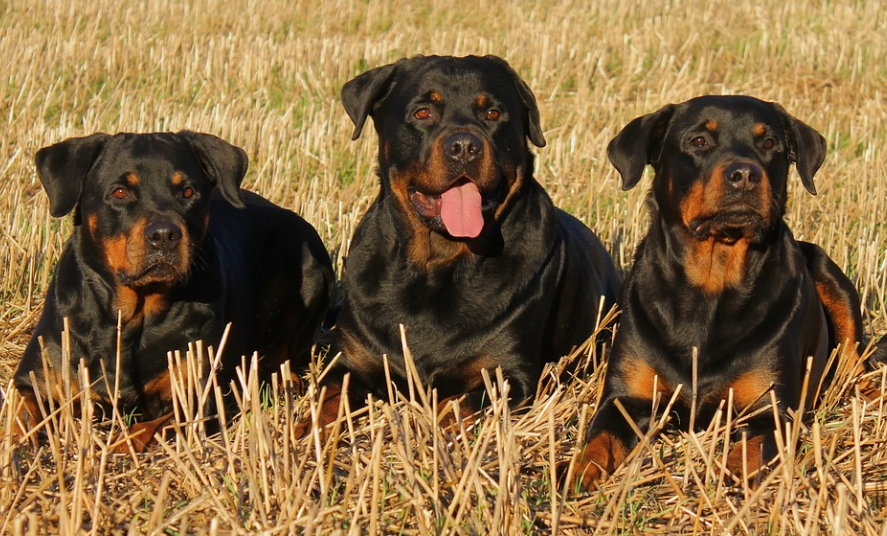Rottweilers are social dogs that are often kept as family pets. However, their natural instincts and behaviors can sometimes lead to problems, especially when they are kept in a pack. Understanding the dynamics of Rottweiler pack behavior can help owners ensure that their dogs are well-behaved and happy.
RELATED TOPICS:
- Uncovering Rottweiler Herding Behavior
- First Heat Impact: Understanding Rottweiler Behavior Changes
- Preventing Nervous Behavior in Rottweilers
- Common Rottweiler Puppy Behavior Issues and Solutions
In the wild, dogs form packs for protection, food, and companionship. Domestic dogs, including Rottweilers, have the same instincts and can exhibit pack behavior when kept together. In a pack, Rottweilers may compete for resources, establish dominance, and even engage in aggressive behavior.
To prevent these issues, it is important for Rottweiler owners to establish clear pack dynamics. This means defining a hierarchy within the pack and providing each dog with its own space, food, and toys. This helps prevent competition and aggressive behavior and encourages the dogs to live together harmoniously.
Additionally, it is important to socialize Rottweilers from a young age. Socialization helps prevent shyness, fear, and aggression and teaches dogs to interact with others in a positive and friendly manner. This is especially important when keeping Rottweilers in a pack, as they will need to get along with other dogs.
When training Rottweilers in a pack, it is important to use positive reinforcement and reward-based training. This helps dogs understand what is expected of them and reinforces good behavior. In some cases, it may also be necessary to separate dogs during training or when there is a conflict between them.
Are Rottweilers Good Pack Dogs?
Rottweilers can make good pack dogs when they are properly socialized and trained. As social animals, Rottweilers have a strong desire to be part of a group and can form strong bonds with other dogs. However, they are also known for their protective instincts and dominance, which can lead to conflict in a pack.
To ensure that Rottweilers are good pack dogs, it is important to establish clear pack dynamics and provide each dog with its own space, food, and toys. This helps prevent competition and aggressive behavior. Additionally, socializing Rottweilers from a young age helps them learn to get along with other dogs and promotes positive and friendly interactions.
Overall, whether Rottweilers are good pack dogs depends on their individual personalities, socialization, and training. With the right management and training, Rottweilers can thrive in a pack and form strong bonds with their fellow dogs.
What Are Considered Pack Animals?
Pack animals are animals that live and hunt in groups for protection, food, and companionship. Some of the best-known pack animals include wolves, lions, hyenas, and meerkats. Other pack animals include primates, such as chimpanzees and baboons, and many species of birds, such as geese and flamingos.
Pack behavior provides numerous benefits, including increased safety and security, improved hunting success, and the sharing of resources. In many cases, pack animals also form close social bonds and cooperate to raise young and care for members of the pack.
While many wild animals form packs, domestic animals, such as dogs, can also exhibit pack behavior. This is because dogs have evolved from wolves and have many of the same instincts and behaviors as their wild ancestors. As such, many dog breeds, including Rottweilers, can make good pack animals when properly socialized and trained.
Are Rottweilers Good With Cats?
The compatibility of Rottweilers with cats depends on several factors, including the individual dog’s personality, socialization, and training. While some Rottweilers may be good with cats and show little or no interest in them, others may chase or attack them due to their strong prey drive.
To ensure that Rottweilers are good with cats, it is important to socialize them with cats at a young age. This can help prevent fear, shyness, and aggression, and can help dogs learn to coexist with cats in a positive manner. Additionally, proper training, including obedience and behavior modification, can help prevent Rottweilers from exhibiting chasing or aggressive behavior towards cats.
Final Thoughts About Rottweiler Pack Behavior: Understanding the Dynamics
In conclusion, understanding the dynamics of Rottweiler pack behavior is essential for ensuring the well-being of your dogs. By establishing clear pack dynamics, socializing your dogs, and using positive reinforcement, you can help your Rottweilers live together in a happy and harmonious pack.







